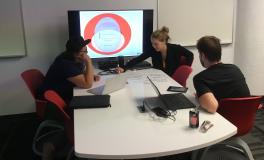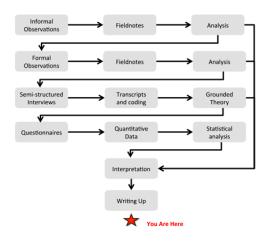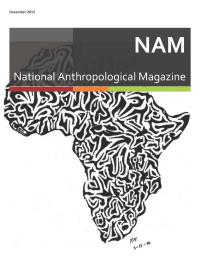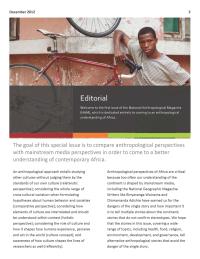Teaching

One of the things I realized in the process of redesigning ANTHROP 2202: Introduction to Cultural Anthropology is that my greatest impact on the world is not as a researcher, but as a teacher. While I have been successful in getting grants to do research on pastoral systems, have published numerous papers in highly-ranked journals, and have contributed to reports of the Food and Agriculture Organization (FAO) and the World Bank, my impact on the lives and livelihoods of pastoralist is limited. My greatest impact on the world is through teaching students at Ohio State where every day I have the ability to make decisions about how to help students learn to think as anthropologists and prepare them for successful professional careers and meaningful lives beyond the degree. Below are some of the innovative strategies that I have used to support student learning, publications about teaching, and syllabi for graduate and undergraduate courses that I have taught at Ohio State.
Syllabi
My goal is to teach anthropology as a discipline that is diverse but integrated. I have taught courses in three of the four sub-fields of anthropology (cultural, physical, and linguistic anthropology) and designed and taught a wide range of undergraduate and graduate courses at Western Oregon University, the University of California at Santa Cruz, Santa Monica College, and the University of California at Los Angeles, including: Language and Culture, Physical Anthropology, Cultural Anthropology, Evolution of Human Societies, Cultural Ecology, Hunter-Gatherers, Ethnographic Methods, Ethnographic Writing, Research Design and Data Analysis, Anthropology of Africa, Pastoral Nomads, and Socialization and Development. I am currently teaching the following courses at the Ohio State University:
- 2202: Introduction to Cultural Anthropology (listen what students have to say)
- 3005: Careers with anthropology (syllabus)
- 3418: Anthropology of Africa (syllabus)
- 3525: History of Anthropological Theory (syllabus)
- 5620: Hunter-Gatherers (syllabus)
- 5623: Cultural Ecology (syllabus)
- 5650: Research Design and Ethnographic Methods (syllabus)
- 7703: Theories in Cultural Anthropology (syllabus)
- 8828: Writing Research Proposals in Anthropology (syllabus)
- 8891.04 Social-Ecological Systems (syllabus)
- 8891.05: Research Design and Ethnographic Methods (syllabus)
Anthropology News

I have written about several of my teaching strategies for Anthropology News.
Moritz, Mark. (2008). Integrating Wikis in Anthropology Courses. Anthropology News 49(3):31 (PDF).
Moritz, Mark. (2009). Teaching Fieldwork Ethics through Instructor Experience. Anthropology News 50(6):33 (PDF).
Moritz, Mark. (2013). Teaching Ethnographic Research through a Collaborative Project. Anthropology News online (July 1, 2013) (PDF).
Moritz, Mark. (2017). Bingo! Or how to teach about African foragers. Anthropology News online (August 10, 2017) (PDF).
Collaborative Research Projects
I have find project-based learning and teaching to be a highly stimulating and effective way for students to grapple with the theories, methods, and ethics of data collection, analysis, and representation in anthropology. The project-based learning often, but not always, leads to scholarly products such as a wiki, book review or a research article. For example, together with graduate students enrolled in 620.05 Cultural Ecology (Spring 2007), we conducted a review of pastoral systems to evaluate whether Sandford's thesis of "too many people, too few cattle" held for West Africa, which resulted in a publication in the Journal of Development Studies (2009) (PDF). In Autumn 2009 we conducted a comparative study of social risk management strategies in pastoral societies with graduate and undergraduate student enrolled in the same course, which has been published in Cross-Cultural Research (2011) (PDF).
In my Research Design and Ethnographic Methods courses (4650H, 5650, 8891.05) I use collaborative research projects to train students in both research design and ethnographic methods by using the OSU campus as our natural laboratory. In Autumn 2010 we examined student behavior in the renovated Thompson Library and presented the results in a poster to the director and staff of the OSU Libraries. In Spring 2011 we examined what makes group work successful and presented the results in poster format to the director and staff of the University Center for the Advancement of Teaching (UCAT). In Spring 2012 we examined whether and how technology in the classroom affects learning and presented the results to the director and staff of the Digital Union [pdf]. In Spring 2013 we examined students' eating behaviors on campus to an audience that consisted of staff, students, and faculty from the Food Innovation Center (FIC) and Campus Dining Services [pdf]. I have written about how I organize these collaborative research projects for Anthropology News.
National Anthropological Magazine (NAM)
In my course on the anthropology of Africa, the goal is to come to an understanding of how anthropologists study and write about the complexity of contemporary Africa and how this is different from conventional representations of Africa and Africans in, for example, National Geographic Magazine. The main assignment is a research project in which students examined one thematic issue in Africa. In Autumn 2012, the final papers were edited for a special issue of the National Anthropological Magazine (NAM) dedicated to Africa.

Here is the editorial: Welcome to the first issue of the National Anthropological Magazine (NAM), which is dedicated entirely to coming to an anthropological understanding of Africa. An anthropological approach entails studying other cultures without judging them by the standards of our own culture (relativistic perspective); considering the whole range of cross-cultural variation when formulating hypotheses about human behavior and societies (comparative perspective); considering how elements of culture are interrelated and should be understood within context (holistic perspective); considering the role of culture and how it shapes how humans experience, perceive and act in the world (culture concept); and awareness of how culture shapes the lives of researchers as well (reflexivity).

Anthropological perspectives of Africa are critical because too often our understanding of the continent is shaped by mainstream media, including the National Geographic Magazine. Writers like Binyavanga Wainaina and Chimamanda Adichie have warned us for the dangers of the single story and how important it is to tell multiple stories about the continent; stories that do not confirm stereotypes. We hope that the stories in this issue, covering a wide range of topics, including health, food, religion, environment, development, and governance, tell alternative anthropological stories that avoid the danger of the single story.
Wainaina's essay is also extremely useful to critically examine the category of hunter-gatherers in anthropology. In my course on Hunter-Gatherers (syllabus), we examine how anthropologists study the diversity of forager societies using the theoretical approaches of cultural ecology, behavioral ecology, and political ecology. Students alos learn how to scientifically study and write about forager societies without recreating myths. One of the homework assignments in the class was for students to write a newsletter about hunter-gatherers and either avoid or embrace as many myths as possible. Jesse Young, one of the students in my 2014 class, used Wainaina's essay to create a fantastic newsletter for the fictive Hadza Development Fund.
2202: Introduction to Cultural Anthropology

Together with graduate teaching assistants Elizabeth Gardiner, Chris Brown, and Mark Anthony Arceño, I recently redesigned the ANTHROP 2202: Introduction to Cultural Anthropology course.
The new course is based on the ANTH101 online course that Dr. Michael Wesch developed at Kansas State University. Wesch is an award-winning professor of anthropology. The premise of ANTHROP 2202 – you cannot think your way into a new way of living, you have to live your way into a new way of thinking – sums up the transformative nature of the course.
Rather than just reading and listening to lectures, students have to complete ten challenges that take them out of the classroom and from behind the computer. In these challenges, students learn to think as anthropologists. For example, in the first challenge students have to talk with a stranger and learn to try new things, ask questions, and make connections. The point is to have a big talk, not small talk. They are encouraged to ask questions like, What would you do if you knew you would die tomorrow? What was the best day of your life? What was the worst day of your life? They write up their experience in a reflective essay in which they discuss how they applied the anthropological concepts of ethnocentrism and cultural relativism.
It is the experiential learning of the challenges that makes the challenges highly effective in helping students to learn how to think as an anthropologist.
We interviewed students about their experiences in 2202. Here are links to the videos: (1) Anthropology 2202: Making Education Affordable and Transformative; (2) Anthropology 2202: Advice from Students; and (3) Anthropology 2202: Lessons for Life.
Teaching Strategies in Anthropology
I take great satisfaction in developing teaching materials, and three of my teaching activities have been published in the third, fourth, and sixth editions of Teaching Strategies in Anthropology, edited by Rice and McCurdy (2003, 2006, 2010). My latest contribution to Teaching Strategies in Anthropology 6th edition (2010) is about the forager wiki that was created by students enrolled in Anthropology 620.01: Hunter-Gatherers (Autumn 2007 and 2008). I have written about the wiki for Anthropology News (2008) (PDF) and presented it at different fora at the Ohio State, including the Teaching 2.0 Symposium of the library (2008), the Digital Union Annual Showcase (2008), TELR’s five minutes of fame (2009), and Digital Media in a Social World conference (2009). Chris Manion and Dickie Selfe have also written about the wiki in Technical Communication Quarterly (2012) (PDF).
Moritz, M. (2003). Exchange theory and experimental economics. In P. Rice & D. McCurdy (Eds.), Strategies in Teaching Anthropology, third edition pp. 101-104). Upper Saddle River (NJ): Prentice Hall.
Moritz, M., & Moore, L. C. (2006). Mini conference with poster presentations. In P. Rice & D. McCurdy (Eds.), Strategies in Teaching Anthropology, fourth edition pp. 1-3). Upper Saddle River (NJ): Prentice Hall.
Moritz, M. (2010). Using wikis in anthropology courses. In P. Rice, D. McCurdy & S. Lukas (Eds.), Strategies in Teaching Anthropology, sixth edition pp. 110-113). Upper Saddle River (NJ): Prentice Hall.
